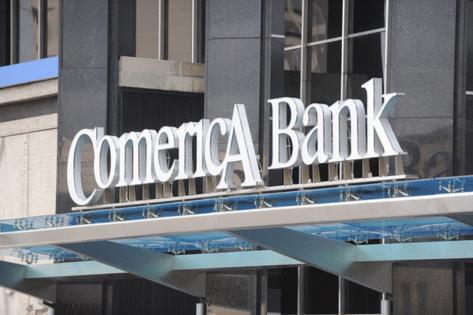Feds sue Comerica Bank, allege fraud against benefits recipients
Published in Business News
The Consumer Financial Protection Bureau on Friday sued Comerica Bank for allegedly charging illegal fees, mishandling fraud complaints and deliberately disconnecting service calls.
The lawsuit filed in the U.S. District Court for the Northern District of Texas seeks a judge's order to halt the alleged practices at the subsidiary of Comerica Inc. It also seeks to provide refunds to affected customers that includes recipients of Social Security, Supplemental Security Income and veterans benefits, and pay unspecified civil penalties into the CFPB's victim relief fund. Comerica Bank, one of the 25 largest bank holding companies in the country, is headquartered in Dallas, but was founded in Detroit and based in the city until 2007.
“The CFPB is suing Comerica Bank for illegally harming disabled and older Americans who count on Social Security and other federal benefits,” CFPB Director Rohit Chopra said in a statement. “By deliberately disconnecting millions of calls and harvesting illegal junk fees, Comerica boosted its bottom line at the expense of Americans living on a fixed income.”
The focus of the lawsuit is the bank's 3.4 million Direct Express cardholders who the bureau described as Americans who mostly don't have bank accounts and are receiving federal benefits. It accuses Comerica of intentionally disconnecting 24 million customer service calls, charging illegal ATM fees to more than 1 million cardholders and impeding customers from exercising their rights under the law.
In a statement sent by spokesperson Matt Barnhart, Comerica Bank accuses the bureau of "doubling down" with a countersuit after it filed its own lawsuit against the bureau last month that challenges the CFPB's "regulatory overreach" and its handling of the case, saying it "undermined the legitimacy of its own investigation."
"Throughout the CFPB’s investigation, we have cooperated by sharing information and data to illustrate the unique nature of this program and the fact that we operate with the oversight of the Fiscal Service," the statement said. "Despite our good faith efforts to provide this critical context, the CFPB has consistently ignored our arguments and documentation."
It added: "Today, the CFPB doubled down by filing a countersuit against Comerica Bank. We will continue to vigorously defend our record as the financial agent for the Direct Express program and remain committed to serving our cardholders."
The bank said it has worked to address issues in the complex program that funds cardholders over a one- to two-day period each month in cooperation with the U.S. Treasury Department's Fiscal Service Bureau. Since 2008, it has contracted with the department to administer the program that pays out monthly benefits through prepaid debit cards that beneficiaries use for groceries, gas and other expenses.
The CFPB said Comerica cut corners to boost its bottom line by not having sufficient customer service staff to handle calls for recipients, resulting in what it says were millions of purposefully disconnected calls and leaving some customers waiting several hours to speak with a representative about unauthorized transactions, charge disputes and lost or stolen cards.
The bureau said cardholders were charged ATM fees in situations where they were entitled legally to free withdrawals. It accused Comerica of misleading fraud victims by saying there had been no error when the bank had found enrollment fraud in the program. Illegal terms of service directed customers to contact merchants to stop pre-authorized payments transfers from their account in situation where the law required Comerica to stop the transfers itself, according to the bureau.
Additionally, the CFPB alleged Comerica of failing to comply 20,000 times with federal law to investigate claims of incorrect or potentially fraudulent charges within a specified time frame. It added that when the investigation did happen, the bank provided vague or unclear findings or blew off customers altogether.
The bank’s vendors also required thousands of cardholders to close their accounts to stop a preauthorized payment, according to the bureau, resulting in additional fees to expedite delivery of their new debit cards to regain access to their benefits.
Comerica, meanwhile, in its Nov. 8 lawsuit against the CFPB and Chopra in the same federal court argued that the agency exceeded its authority under the Consumer Financial Protection and Electronic Fund Transfer acts in its investigations that began in 2021.
It requested a judge rule that the CFPB's prohibition on unfair, deceptive or abusive acts or practices doesn't allow it to set call wait times or make Comerica liable for not preventing or detecting fraudulent transactions. It also wanted a ruling that the bureau acted unconstitutionally by using unappropriated funds, failed to provide proper notice on a new interpretation of provisions and must grant the costs, attorneys' fees and other expenses incurred related to the investigation.
Comerica Inc. had $63.9 billion in deposits at the end of September and recorded $528 million in net income during the first nine months of 2024, down 38% year-over-year. Its shares were falling on Friday afternoon by 1.1% to $69.12.
Detroit-based Rocket Mortgage on Thursday also filed a lawsuit against the federal government. It is seeking to dismiss a lawsuit from the U.S. Department of Housing and Urban Development that claims the Detroit lender discriminated against a Black homeowner who received an allegedly low appraisal when seeking to refinance her property loan. Rocket challenges what it calls inconsistencies between regulations that require appraiser independence and enforcement actions that hold lenders accountable for those appraisers.
©2024 www.detroitnews.com. Visit at detroitnews.com. Distributed by Tribune Content Agency, LLC.












Comments